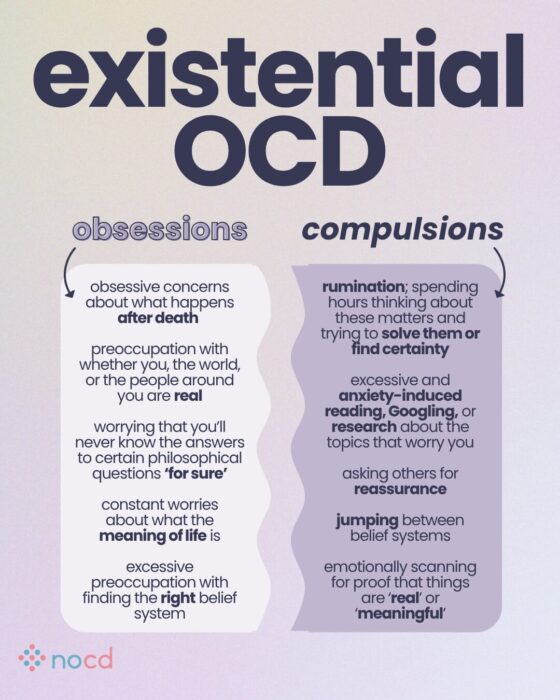Existential obsessive-compulsive disorder (OCD) is a subtype of OCD, that causes intrusive thoughts about reality, existence, and life’s deep unanswerable questions. While it’s common to have some curiosity about these topics, if you have existential OCD, you don’t just ponder these questions—you feel an overwhelming need to find absolute certainty, leading to anxiety, rather than intellectual exploration.
To understand existential OCD, it’s important to first define OCD itself. OCD is a mental health condition characterized by intrusive, unwanted thoughts, feelings, urges, images, and sensations that cause distress. In response, people with OCD engage in compulsions—repetitive physical or mental actions—aimed at reducing anxiety. However, this relief is only temporary; compulsions ultimately reinforce and worsen the OCD cycle over time.
Read on to learn more about the signs and symptoms of existential OCD, and how to get help.
Existential OCD symptoms
If you have existential OCD, intrusive thoughts create a relentless, urgent need for definitive answers to questions like:
- What is my purpose?
- Is there a God?
- What if none of this is real?
The inability to answer these questions with 100% certainty fuels intense anxiety, leading to hours of rumination, compulsive research, avoidance, or reassurance seeking in an effort to find relief. However, the more you try to resolve your doubts through these behaviors, the deeper they’ll feel—causing significant distress, anxiety, and even depression.
Existential dread
One of the most overwhelming experiences associated with existential OCD is existential dread. Existential dread is best defined as the intense, unsettling fear or anxiety that arises when confronting thoughts about reality, purpose, or what happens after death. While many people deal with existential dread at times, people with OCD experience these thoughts as inescapable, and deeply distressing. Instead of being able to process them and move on, you may feel an urgent need to resolve questions through compulsive behavior.
If your existential dread is tied to existential OCD, stopping it isn’t about finding the “right” answer—it’s about recognizing the signs and symptoms of OCD, and seeking proper treatment. Working with a specialized OCD therapist can help you build tolerance for existential uncertainty, and break free from the cycle of obsessions and compulsions.
Find the right OCD therapist for you
All our therapists are licensed and trained in exposure and response prevention therapy (ERP), the gold standard treatment for OCD.
Common obsessions in existential OCD
Obsessions in existential OCD often revolve around deep, unanswerable questions that create distress and a need for certainty. “Just as people’s experiences and beliefs about the meaning of life, death, and existence vary widely, the symptoms of existential OCD can involve nearly any weighty question,” says Dr. Keara Valentine, Psy.D.
Some common existential OCD obsessions include:
- What if I’m not really here? How would I know?
- What if my whole life is a simulation and nothing around me is real?
- If I don’t actually exist, does anything I do matter?
- What if life has no meaning?
- What if our existence is just an accident?
- What happens after death, and how can I be sure?
These thoughts aren’t just passing curiosities—they trigger anxiety and an overwhelming urge to be certain. But, because these questions don’t have definitive answers, the search for reassurance only leads to more doubt and distress.
Common compulsions in existential OCD
Compulsions in existential OCD are an attempt to eliminate doubt and find certainty—but the relief they provide is only temporary, trapping you in the OCD cycle. “The problem with all of these compulsive behaviors is that their aim is to find concrete answers to questions that do not have any,” says Dr. Valentine. This leaves you constantly searching for answers that you may accept for a brief period of time—only to begin experiencing doubts again.
Common compulsions in existential OCD include:
- Excessive research: Spending hours searching online, reading philosophy, or watching videos to find a definitive answer.
- Seeking reassurance: Asking others if they are real, if you are real, or if life has meaning.
- Mental reviewing: Replaying past experiences to try to “prove” reality or existence.
- Testing reality: Engaging in actions to confirm you exist, such as checking your reflection in the mirror.
- Thought neutralization: Trying to counter obsessive thoughts with logic or self-reassurance.
While these compulsions may seem to offer relief in the moment, they only make distress worse over time.
How is existential OCD treated?
The first step to getting effective treatment is understanding that you need help. “Because of how commonplace existential thoughts and questions are, individuals with existential OCD may delay seeking treatment,” says Dr. Valentine.
Even once you do seek treatment, getting a diagnosis can be difficult. Because existential OCD often involves an evaluation of life and its meaning, it can be confused with depression. It is also possible for existential OCD to be inaccurately interpreted as general worry and existential fear, or even generalized anxiety disorder. Working with an OCD specialist is key for getting an accurate diagnosis and subsequent care.
While existential OCD may seem different from other subtypes, its core features are the same as other OCD subtypes—and it can be treated using the same approaches. “Although it may be difficult to identify at first, the only real difference between existential OCD and any other form of the disorder is the nature of the intrusive thoughts,” says Dr. Valentine.
Read on to learn more about the recommended treatment for existential OCD—and all forms of OCD: exposure and response prevention (ERP) therapy.
ERP therapy for existential OCD
ERP is a specialized form of cognitive behavioral therapy (CBT) designed specifically for OCD. ERP works by having you gradually confront your fears, while learning response prevention techniques to resist compulsions. Instead of seeking certainty, ERP teaches individuals to sit with uncertainty, and build tolerance to discomfort. Over time, this approach helps you feel less distress from your intrusive thoughts.
A trained therapist will guide you through intentional exercises designed to bring up distressing thoughts, while you practice new responses to these feelings. This practice—in the relative safety of a therapy session—can help you gain the skills necessary to navigate daily life, without avoiding your fears, or relying on rituals like excessive research.
ERP exercises for existential OCD might include:
- Reading articles or watching videos that trigger existential fears, and delaying compulsions for increasingly long periods of time: Your therapist may even have you set a timer to practice gradually increasing the amount of time in between this “exposure” and your compulsive behavior. Eventually, you’ll likely find you have less desire to engage in the compulsion, entirely.
- Writing down feared thoughts and reading them repeatedly without reacting: Instead of responding with compulsions, your therapist might encourage you to tell them the feelings of distress you’re experiencing—without acting on them. Over time, you’ll build a greater tolerance for these sorts of emotions.
While the urge to “figure things out” may feel overwhelming, resisting compulsions helps break the cycle of OCD. Your therapist will be with you every step of the way—and exercises move at a gradual and manageable pace. “ERP never starts with the most intrusive thoughts,” says Dr. Valentine. “As you get more comfortable, you’ll work to tackle more difficult thoughts.”
The results are worth it. ERP can help you stop feeling trapped by your thoughts, and instead build the confidence to live with life’s uncertainties. With time, these uncertainties will also likely start to feel less important. “The more you’re confronted with your feared existential thoughts, while withholding from engaging in compulsive responses, the less feared those thoughts may become,” Dr. Valentine explains.
With the right treatment and support, it’s possible to stop the endless loop of questioning, and refocus on life in the present moment.
Bottom Line
Existential OCD can cause you to endlessly dwell on questions that don’t have definitive solutions. This relentless need for certainty can feel overwhelming, leaving you stuck in fear and doubt. But, recovery is possible, especially with ERP therapy. By breaking the cycle of obsessions and compulsions, and learning to sit with uncertainty, you can loosen OCD’s grip on your life.


